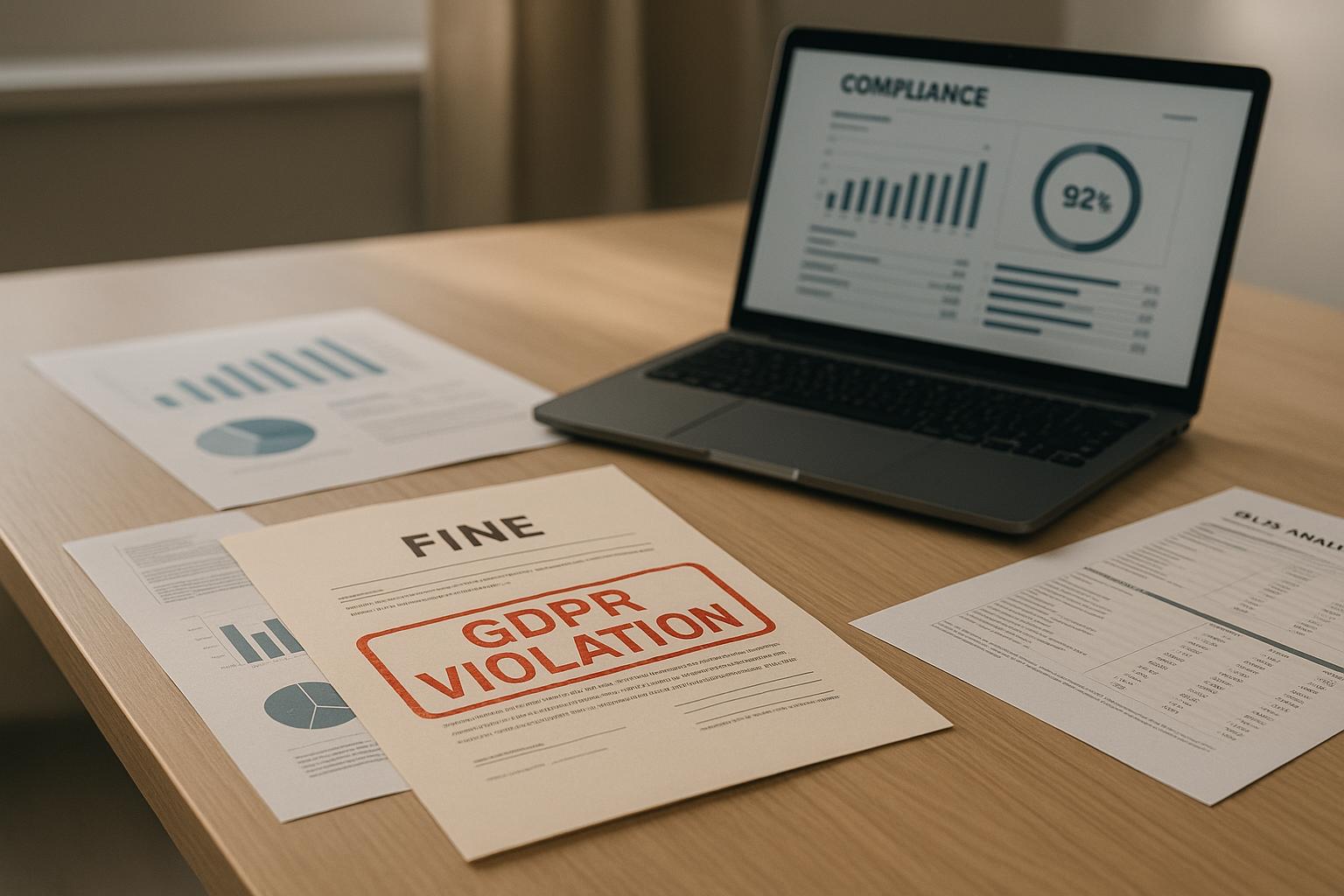Top GDPR Fines in FinTech Industry

GDPR compliance has become a high-stakes challenge for FinTech companies. Handling sensitive financial and personal data makes these firms frequent targets for enforcement, with fines now surpassing $6.4 billion by 2025. Non-compliance risks don't stop at financial penalties - reputational damage and operational disruptions can cripple even fast-growing startups.
Key takeaways:
- FinTech's compliance hurdles: Cross-border data transfers, user consent management, and third-party vendor risks are major pain points.
- Rising fines: The five largest GDPR penalties in 2025 alone exceeded €3 billion.
- Data breaches: In 2024, 35.5% of breaches stemmed from third-party access.
- Technology challenges: AI, blockchain, and Open Banking APIs add complexity to compliance.
The stakes are clear: FinTech companies must address these risks head-on to avoid fines, build trust, and ensure long-term success.
Largest GDPR Fines in FinTech
The enforcement of GDPR regulations has intensified, with regulators showing little patience for lapses in compliance. FinTech companies that fail to meet these stringent standards are now facing hefty financial penalties.
Top GDPR Fines by Company and Amount
A review of past fines reveals that FinTech firms involved in intricate financial operations and cross-border data transfers are particularly vulnerable to significant penalties. These cases highlight the importance of adhering strictly to GDPR requirements to avoid steep fines.
Most Common Violation Types
In the FinTech industry, several recurring GDPR violations have been identified, including:
- Insufficient legal basis for data processing: Companies often fail to establish a valid reason for handling personal data.
- Improper management of cross-border data transfers: This has become a key focus area for regulators.
- Flawed consent processes: Weak or unclear consent mechanisms are now under heavier scrutiny.
- Lapses in data security: These leave companies exposed to breaches and other cybersecurity risks.
Beyond the financial impact, these violations erode customer trust and can stall a company's growth. They also reflect broader enforcement trends, signaling regulators' commitment to holding the FinTech sector accountable.
GDPR Enforcement Trends in FinTech
The enforcement of GDPR regulations has ramped up significantly, with the five largest fines in 2025 alone exceeding €3 billion. By October 2025, cumulative fines had reached a staggering €6.7 billion. These figures highlight the ongoing compliance hurdles faced by FinTech companies.
Since the GDPR's implementation in May 2018, Ireland has issued nearly €3.5 billion in fines. Meanwhile, Spain has taken a different approach, targeting smaller businesses with 1,021 fines totaling approximately €120,750,450 as of September 2025.
Growing Focus on Cross-Border Data Transfers
Cross-border data transfers have become a major area of concern, with non-compliance leading to record-breaking penalties. One high-profile example is Meta’s €1.2 billion fine for failing to safeguard cross-border data flows. Adding to this, the U.S. Department of Justice introduced a rule in April 2025 under Executive Order 14117, which restricts international transfers of financial data to "countries of concern" on national security grounds.
FinTech companies face unique challenges in this area due to their reliance on cloud-based infrastructures and third-party vendors. In 2024, 35.5% of data breaches were linked to third-party access, with IT services, cloud platforms, and software providers being the most vulnerable points of failure.
To address these risks, regulators now require detailed Transfer Impact Assessments (TIAs). These assessments evaluate the legal conditions in recipient countries, including government surveillance practices, and determine whether additional safeguards are needed beyond standard contractual clauses (SCCs). While the EU-U.S. Data Privacy Framework offers a pathway for transfers to certified entities in the U.S., its long-term stability remains uncertain, pushing companies to prepare alternative compliance strategies.
Emphasis on Data Transparency and User Rights
Regulators are increasingly scrutinizing how FinTech companies handle user data and uphold transparency. This includes ensuring that businesses can effectively manage data access requests, deletion requests, and data portability rights.
The financial sector has become one of the most penalized industries under GDPR, with fines often related to weak security protocols and mishandling of sensitive financial information. Executives are now being held personally accountable for data protection failures, signaling a shift toward stricter enforcement.
These transparency requirements are also setting the groundwork for regulating emerging FinTech technologies.
New FinTech Technologies and GDPR Enforcement
The rise of AI and blockchain technologies in FinTech is adding new layers of complexity to GDPR compliance. In 2024, the European Data Protection Board clarified that training AI models using EU personal data constitutes data processing under GDPR. This means companies must ensure lawful processing and implement robust safeguards for data transfers, regardless of where the AI model is hosted.
Looking ahead, Gartner predicts that by 2027, over 40% of AI-related privacy breaches will involve cross-border data exposures. This reflects the inherent challenges of AI systems, which often operate across multiple jurisdictions without clear oversight of data flows.
Blockchain technology introduces its own set of challenges, particularly around issues like data immutability and the GDPR's "right to erasure." Regulators are beginning to address these conflicts, especially as decentralized financial platforms grow in popularity.
Regulatory bodies are making it clear that technological complexity is not a valid excuse for non-compliance. FinTech companies are now expected to embed privacy protections into their systems from the very beginning. Balancing innovation with rigorous adherence to GDPR standards has become a non-negotiable requirement for the industry.
GDPR Compliance Best Practices for FinTech
Tackling GDPR compliance in the FinTech world means creating a structured framework that directly addresses the industry’s specific challenges.
Building Strong Compliance Programs
Accountability sits at the heart of GDPR. To meet this principle, FinTech companies must document their data processing activities and perform regular audits to stay on track with compliance.
Start by mapping all personal data - this includes customer details, transaction records, and identity verification documents. Track how this data moves through your systems and any third-party services.
For every processing activity, clearly document the lawful basis, whether it’s tied to contract obligations, legitimate business interests, or legal requirements.
Regular audits are essential to spot potential gaps. Make sure to incorporate a Cybersecurity Incident Response Team (CSIRT) into your Incident Response Plan (IRP) to handle breaches efficiently. Once a solid compliance program is in place, the next step is to focus on strengthening data security and privacy measures.
Strengthening Data Security and Privacy Measures
Put strong security measures in place to protect personal data from breaches or misuse. Develop a thorough Incident Response Plan (IRP) that details how to detect, contain, and report data breaches effectively. Use your IRP framework to act quickly and minimize risks if a breach occurs.
sbb-itb-e766981
How Financial Advisory Supports GDPR Compliance
Financial advisory services play a critical role in helping FinTech companies tackle GDPR compliance challenges. By blending financial planning with regulatory compliance, businesses can adopt more strategic and data-informed approaches to managing privacy requirements.
Leveraging Financial Expertise for Compliance Management
Financial planning and analysis (FP&A) can transform GDPR compliance from a burdensome expense into a strategic advantage. By integrating compliance costs into financial models, companies can allocate resources more effectively and make informed decisions.
Data engineering supports this by tracking compliance-related expenses - such as training programs and system upgrades - while also quantifying the potential financial impact of non-compliance. These insights are woven into detailed financial models, offering a clear picture of the costs and benefits involved.
Phoenix Strategy Group’s FP&A systems help FinTech companies design compliance-focused financial models that mitigate regulatory risks. Their Integrated Financial Model combines compliance metrics with traditional financial KPIs, offering leadership teams a more comprehensive view of how regulatory spending influences overall business performance.
Custom metrics systems are especially valuable for monitoring compliance-related financial data. These systems allow companies to track spending on privacy infrastructure, legal fees, and employee training. At the same time, they measure the returns on these investments - such as reduced regulatory risks and enhanced operational efficiency.
Accurate cash flow forecasting and evaluations of unit economics reveal a promising trend: initial investments in compliance often lead to long-term benefits, such as stronger customer trust and heightened investor confidence. This financial discipline naturally extends to better risk management as companies grow.
Risk Management for Expanding FinTech Companies
As FinTech companies scale, managing compliance-related risks becomes even more crucial. Strategic financial management lays the groundwork for regulatory resilience, but risk management practices ensure it remains sustainable.
For example, mergers and acquisitions (M&A) advisory has become essential, as investors now closely examine GDPR compliance during due diligence. Demonstrating strong compliance practices can be a deciding factor in securing funding or completing a deal.
Revenue engine analysis sheds light on how privacy regulations impact business models. Interestingly, many FinTech companies discover that robust privacy controls not only meet regulatory standards but also enhance customer acquisition and retention. These insights turn compliance investments into a competitive edge.
Phoenix Strategy Group’s fractional CFO services provide executive-level expertise tailored to growth-stage FinTech companies. These services streamline compliance investments, ensuring they align with broader business goals.
The fundraising process increasingly requires companies to showcase their commitment to privacy and compliance. Businesses with well-established GDPR compliance programs often achieve higher valuations because they present a lower regulatory risk to investors. In this way, compliance spending delivers measurable results through improved funding opportunities.
Developing KPIs that focus on compliance metrics helps companies track the impact of their privacy initiatives. These could include metrics like customer consent rates, data processing efficiency, or the cost per compliant customer interaction. When combined with traditional financial KPIs, these metrics offer a well-rounded view of the return on compliance investments.
Conclusion: FinTech GDPR Compliance Moving Forward
Regulators are cracking down on FinTech firms that fail to meet GDPR standards, making it clear that staying ahead of compliance requirements is not optional - it's essential.
But GDPR compliance isn't just about avoiding fines. It's an opportunity to build trust, streamline operations, and position your business for sustainable growth. Companies that embrace compliance as a strategic advantage often see stronger customer loyalty and increased operational stability.
This mindset shift highlights the importance of blending financial expertise with compliance efforts. When compliance spending is aligned with broader business goals, it doesn’t just meet legal requirements - it creates real value. It can boost customer acquisition, improve retention, and even enhance investor confidence, transforming what might seem like a cost into a driver of growth.
Take it from Phoenix Strategy Group: firms with strong compliance frameworks are better positioned to succeed in fundraising and mergers and acquisitions. Investors are paying closer attention to GDPR compliance during due diligence, making it a critical factor in competitive funding scenarios.
To stay ahead, FinTech companies need to build scalable compliance systems and track performance with KPIs that tie financial outcomes to compliance efforts. This integrated approach ensures growth while meeting regulatory demands.
The most successful FinTech firms treat GDPR compliance as a core business function - combining financial know-how, data expertise, and strategic planning to navigate the complex regulatory landscape and deliver lasting value. Compliance, when done right, becomes a cornerstone of long-term success.
FAQs
What challenges do FinTech companies face with GDPR compliance, and how can they overcome them?
FinTech companies face several hurdles, including data mapping, managing cross-border data transfers, and navigating the fine line between innovation and regulatory compliance. These challenges stem from the intricate task of handling sensitive financial information while staying within the boundaries of GDPR regulations.
To tackle these obstacles, it's essential to implement a clear and structured compliance framework. This should include detailed data mapping, lawful data processing methods, robust security measures, and continuous monitoring systems. Regular audits and strong data governance practices play a key role in spotting potential risks early and ensuring long-term compliance. Taking these proactive steps not only keeps companies aligned with GDPR but also strengthens trust with both customers and stakeholders.
What challenges do cross-border data transfers pose for GDPR compliance in the FinTech industry, and how can companies address them effectively?
Cross-border data transfers pose notable hurdles for GDPR compliance in the FinTech sector. Companies must guarantee that personal data moved outside the European Economic Area (EEA) is safeguarded under the same stringent standards upheld within the EU. This becomes even more critical for FinTech firms, which often depend on global operations and data flows to function effectively.
To tackle these challenges, FinTech companies can utilize Standard Contractual Clauses (SCCs), pursue certifications, and carry out transfer impact assessments. These measures not only help reduce potential risks but also ensure compliance with GDPR while enabling the smooth international exchange of data - an essential factor for businesses operating across borders.
How can combining financial planning with GDPR compliance benefit FinTech companies?
Combining financial planning with GDPR compliance offers FinTech companies a range of benefits. By weaving compliance into everyday operations, businesses can steer clear of hefty fines, safeguard customer data, and strengthen client trust - an invaluable asset in today’s digital landscape.
This strategy not only aids in making smarter business decisions but also sets companies apart as forward-thinking leaders who prioritize data security and regulatory adherence. On top of that, aligning compliance with financial goals can lead to improved efficiency, inspire new ideas, and lay the groundwork for sustainable growth in a competitive industry.




